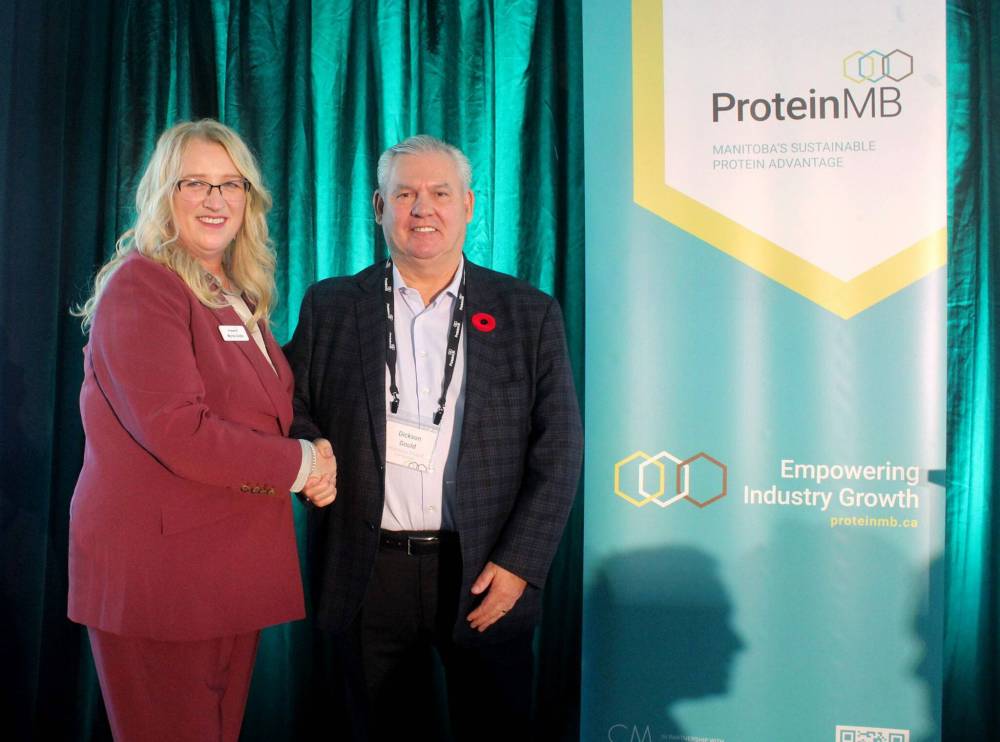
It’s been more than four years in the making, but an industry-led organization called Protein MB has been launched to help Manitoba attain what industry officials say is Manitoba’s rightful place as a global leader in sustainable protein production.
It is being heralded as a unique approach in that it will seek to establish collaborations across the spectrum of protein producers, from the livestock sector to plant protein to alternative proteins (think cricket powder).
Since 2019 when the province first started to come up with a focused protein strategy, the sector has attracted more than $1 billion in investment and created more than 1,000 jobs.
SUPPLIED Myrna Grahn, executive director of Protein MB, and Dickson Gould, CEO of the Progressive Group of Companies.
In 2022 the top protein exports from Manitoba totalled $8 billion.
Dickson Gould, the CEO of the Progressive Group of Companies, a diversified operation that owns hog and turkey production and the processed meat brand, Winkler Meats, is chair of Protein MB and has been chairing the government initiative that has been working on the protein initiative for the past five years.
“I think if you ask many people in the province, they would never guess that the industry is worth $8 billion,” he said. “It’s something we should all be proud of.”
With $5 million of funding for five years from the federal-provincial Sustainable Canadian Agricultural Partnership, the organization will be hosted by the Manitoba branch of Canadian Manufacturers & Exporters (CME), which will act as project managers. (Staff will work out of CME offices and leverage its finance and administrative functions.)
The organization will now work towards implanting the 10 strategic areas of focus that the provincial government’s Manitoba Protein Advantage had already come up with.
Myrna Grahn, executive director of Protein MB, stressed that a lot of the work it has ahead of it has to do with bringing people together.
“We’re here to facilitate the collaboration, the really hard part of working together,” she said. “We can be quite silo-ed in Manitoba. We have the team to be able to bring people together.”
While the organization’s mandate might sound like something that is already being addressed, industry leaders see it as an important targeting of what may be Manitoba’s true sweet-spot — positioning Manitoba as a global leader in the production of sustainable protein.
Michael Mikulak, executive director of Food & Beverage Manitoba, said just in the past couple of years he has seen increased interest in the sector and a desire for additional investment both from existing players and outside investors.
“We’re seeing a real global push for more protein especially as countries develop and consumers want higher quality protein,” he said. “We need to seize that opportunity as a province. We have the resources here already. We have to lean in.”
The province already has a booming grain industry, the bedrock of the province’s ag sector, as well as substantial pork production. It’s also now the home to the largest pea protein plant in the world, the Roquette plant in Portage la Prairie, and sources say another operator might soon be lined up to take over the pea and canola protein plant after Merit Functional Foods was placed into receivership.
The initiative is also very connected to the province’s research infrastructure, which was significantly enhanced earlier this year with Jim House being the new Manitoba Strategic Research Chair in Sustainable Protein in the Department of Food and Human Nutritional Sciences in the Faculty of Agricultural and Food Sciences at the University of Manitoba for a six-year term after the province’s $1.5 million investment in the six year initiative.
Protein MB has its work cut out for it working to implement 10 strategic areas including: branding, marketing and communications; measurement, monitoring and verification; and innovation and workforce development.
Dickson wondered out loud about what another $1 billion or $2 billion worth of investment might mean to the industry.
“We are going to work together to make the industry more competitive,” he said. “We’ll look to create the right infrastructure, the right support mechanisms and the right policies to allow the industry to grow.”
Although Protein MB will not be a funding agency, Grahn said it will seek additional funding to manage new projects as they might come along.
She said rather than there being a competitive relationship between the plant and animal protein groups, she envisions synergies that her organization will be able to help generate.
“We are very open-minded,” she said.
Since the emphasis is on sustainable protein, she said she could imagine helping pork producers, for instance, transition to a different feed stock that is less energy intensive to produce or ones that generate a smaller carbon footprint.

Martin Cash
Reporter
Martin Cash has been writing a column and business news at the Free Press since 1989. Over those years he’s written through a number of business cycles and the rise and fall (and rise) in fortunes of many local businesses.
Read full biography


